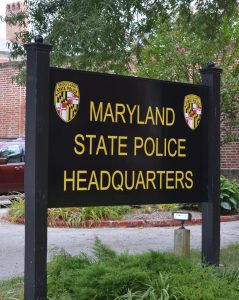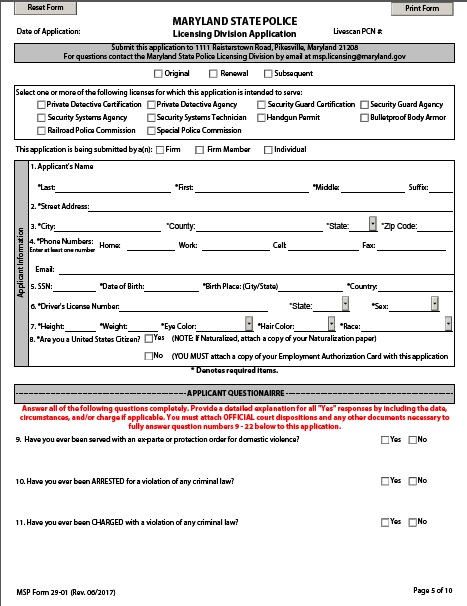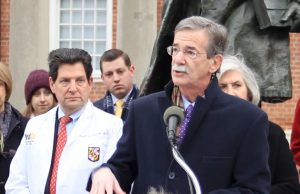Concealed Carry: Does Maryland State Police Need to Know if Permit Applicant is Taking Viagra?
BALTIMORE — With violent crime in Baltimore approaching an all-time high, it’s no secret that much of the malfeasance gripping the city is drug-related. But should law-abiding citizens who apply for a Maryland State Police Handgun Wear and Carry Permit be required to list anxiety, hormone, erectile dysfunction, and breast cancer medications as part of the application process? And what about banking? Should the way you handle your cash invalidate your right to self-protection?
To understand the troubling intimidation factor that intrusive medical and money questions bring to Maryland’s Wear and Carry Permit application process, we spoke with Post-Examiner contributor Brian Bissett. Bissett is currently appealing his second consecutive restricted Maryland concealed carry permit and has asked the Maryland State Police to open their files as a part of that appeal process.
This is the second part of a two-part interview. The first part of this interview may be found here.
BPE: Your comments in the previous article about the politics surrounding gun legislation were most enlightening. But I’d like to get back to the carry permit application process with a couple of oft-asked questions. First, do you have any idea how many gang members annually apply for a carry permit?
Bissett: I have no idea, but I can’t imagine it would be many.
BPE: Do you have any numbers on how many felons have attempted to lawfully purchase a gun?
Bissett: No, I don’t have any statistics for those things either.
BPE: I realize it may appear that I just set up a couple of straw men for you to knock down, but don’t questions such as these help us get around to the thorny issue at hand — that is — what kind information the State Police should and should not be tracking in the permit process?

Bissett: I believe that they have been tracking all this information for a while, and I’ve been told they have a database with all of this information.
Certain information on those applications is what I’m looking for.
In fairness to the Maryland State Police, it may not go back as far as I want. But they most certainly have a database for all of this permit information going back the last twenty years.
They could easily query the information I’ve requested.
BPE: What sort of information are you requesting?
Bissett: I’d like to look at the racial breakdown of approvals and denials, as well as the kind of personal information which has been mined and stored.
One of the things I found troubling when I first went through the permit process is, I was asked on my interview to put down every single prescription drug I am taking.
I was pretty taken aback by that. What if you are a man taking Viagra or a woman taking Avasitin for breast cancer? Should that be included on any sort of application? Come on – you could never get a judge to sign a search warrant for that.

BPE: How does the State Police application on this point compare to what you underwent for a Federal Government security clearance?
Bissett: In the Federal process, they are only allowed to ask a physician one question in regard to mental health: “If the person under investigation has a condition that could impair judgment, reliability, or ability to properly safeguard classified national security information?”
If the answer is No, no further questions can be asked. If the answer is Yes, only then they may ask additional questions.

The question here is, why aren’t the Maryland State Police only asking, “If the person under investigation has a condition that could impair judgment, reliability, or ability to properly and safely carry a firearm in public?”
The fishing expedition of requiring everyone to give personal medical information – including all prescription medication they are taking and any mental health diagnosis is – in my opinion – a violation of HIPAA and done to dissuade and intimidate those with any embarrassing medical or mental health conditions from applying for a permit.
Is it their business if someone has breast cancer, erectile dysfunction, or general anxiety disorder? Quite frankly, it’s amazing nobody has sued them over this issue.
BPE: Isn’t it reasonable, though, to ask if the applicant is on any psychotropic medications?
Bissett: I would say no, in most cases, unless the person has a history of schizophrenia or is bi-polar. People who have some type of mental disorder tend to be victims of violent crime more than they are perpetrators.
Don’t get me wrong. I believe that people who have been forcibly institutionalized because they present a danger to themselves probably shouldn’t be allowed to obtain a permit. But if you are taking a prescription medication to help you relax when you fly? There they want a note from your doctor, and what doctor can predict a person’s mental condition once they leave the office?
Look, people go through problems all of their life. They get divorced; they lose a loved one to death. They may be treated for depression and then they recover. Should an incident such as profound grief mean they should be denied the right to own a firearm in perpetuity?
BPE: Doesn’t the Federal Background Instant Check system look at that sort of thing, too?
Bissett: That’s a very difficult question to answer, and the only reason I know this much about it is because I’m presently taking a Department of Defense class.

There is not a single database or repository that a law enforcement agency can go to that will necessarily pick up every arrest and/or crime a person may have committed. The records are siloed to a certain degree. Then when it comes to mental health, you’re in a whole other ball game, because those records have also been siloed. Then there is HIPPA and the Privacy Act. Most organizations will err on the side of caution because they are potentially liable for millions of dollars if they disclose certain information.
The thing that disturbs me – and I know others feel this way as well – is that they are effectively ending mental health treatment in this country.
When you have something like the New York Safe Act, where a mental health professional must report anybody who might be a risk, they report everyone, no matter how minute the risk, and that discourages people from seeking the treatment they need.
If you drive people underground, and they don’t seek treatment, you create the potential for even greater problems.
BPE: As we are speaking, Baltimore City is quickly approaching the 250 murder mark for the year. Its also gearing up for a major election. Is anyone in the mix for political office there taking a pro-gun or a pro-self defense position?
Bissett: I wouldn’t know, to be honest with you, because I don’t follow city politics to that degree. The one thing I can tell you is that I often listen to an African-American talk radio station, and whenever the subject of gun ownership comes up, four out of five callers express outrage that they cannot either purchase a firearm or get a permit to carry one.

When the state passed the Firearms Safety Act of 2013, they created a process that was much more complicated for your average person to buy a firearm. They have to take a safety course and fire one bullet out of a handgun. But there are no ranges in Baltimore City. So, you are not going to be able to fulfill that requirement using public transportation.
There is a requirement to get fingerprinted, and I don’t know how many places do that in Baltimore City. Then there is the requirement to complete the application online using a credit card.
Believe it or not, there is a class of people in this country who do not use credit cards.
BPE: That would bring us back to the hypothetical case of the house-keeper or the carpenter who just deals in cash?
Bissett: Yes. Then they have to use a scanner to enter their documents. Brian Frosh says they can just go to a library, but here you have individuals who are not technically savvy, using equipment which may be on lock-down or not adequately secure. It really puts city residents at a disadvantage to buy a gun, not to mention trying to obtain a carry permit.
BPE: Wouldn’t such technical requirements particularly discriminate against African-American and Hispanic city residents?
Bissett: I believe they do. Given everything we have talked about here, African-Americans and Hispanics are much less likely than a white person to be able to navigate the handgun permit process. And yet, they are more likely to be the victim of a crime.
Let’s face it: The State Police have created a process that is so intricate, so complicated, so convoluted, that a recent immigrant or an uneducated person doesn’t stand a chance.

If you compare a person who went to Harvard to someone who went to Baltimore City Public Schools, the city resident is much less likely to navigate that process.
BPE: Yet the Harvard graduate isn’t the one living in a dangerous neighborhood?
Bissett: Exactly, and that is where people like Civil Rights Attorney Dwight Pettit contend that this system is inherently racist.
BPE: You did a pretty thorough job of charting the correlation between strict gun laws and an increase in crime in Baltimore City. Have you looked at other Maryland Counties?
Bissett: I have not because, frankly, getting the numbers together for Baltimore and similar cities was hard enough. I knew I’d be crucified for any mistake, and to date, nobody has challenged the validity of the numbers I published in the graphs. It’s always been, “Well, even though there may be a mathematical correlation, I don’t believe this is the cause.”
That’s the reason I went through the Bradford-Hill causality theorem. It shows that, more likely than not, restricting an honest person’s access to a firearm is going to result in more crime. By restricting I mean going beyond checking a person’s background at the point of the sale.
I support the instant background checks, which determine that this person is who they say they are; that this person is not a felon, and is qualified to own a gun. However, I don’t think that stops anyone who wants to own a gun from obtaining a gun. What it does do is it prevents them from getting the gun as quickly as they’d like to. But that’s a topic for another conversation.
BPE: Where are Americans today on the right to carry?
Bissett: Well, following the Florida example, we’ve gone from states enacting “Shall Issue” laws to the “Constitutional Carry” which means you don’t need a permit to carry your firearm as long as you are a law-abiding citizen. I believe there are now thirteen states which allow you to strap it on your hip. They said the same thing about that that they did about concealed carry permits, but by and large that hasn’t happened.
BPE: So, in your opinion, Maryland lags behind on idea of a Constitutional Right to carry?
Bissett: I believe the county is moving in that direction. And not just conservatives.
I have a good friend at work, and his wife has been a social worker in Baltimore City for the past 25 years. Interestingly enough, this guy is very liberal, but he and I are very good friends.
I put this friend down as a reference, when I applied for my carry permit. I was later told that when the investigator called him, he said, “Let me be perfectly clear: I don’t like guns, I don’t own guns, I don’t believe in guns. And I think the world would be a better place if there were no guns. But if anybody should be carrying a gun, it’s this guy.”
BPE: Wow!
Bissett: Yeah, the investigator said he had never heard a reference like that before. Anyway, as I said, this man’s wife has been a social worker for a long time in Baltimore City. She works with a lot of disadvantaged youth, and they have all told her the same. “If you’d like a gun, I can have one for you in an hour.”
BPE: What does it cost to buy such a handgun in Baltimore City?
Bissett: She said the answer from all of them is also the same. “That depends on how many people have been killed with it. If no one has been killed with the gun, then that’s a clean gun. Those guns cost top dollar. The more crimes that can be tied to a gun, the cheaper it becomes.”
(This is the second part of a two-part interview. The first part may be found here.)

Anthony C. Hayes is an actor, author, raconteur, rapscallion and bon vivant. A one-time newsboy for the Evening Sun and professional presence at the Washington Herald, Tony’s poetry, photography, humor, and prose have also been featured in Smile, Hon, You’re in Baltimore!, Destination Maryland, Magic Octopus Magazine, Los Angeles Post-Examiner, Voice of Baltimore, SmartCEO, Alvarez Fiction, and Tales of Blood and Roses. If you notice that his work has been purloined, please let him know. As the Good Book says, “Thou shalt not steal.”

There is no need for ANY of these forms or questions. Constitutional Carry has not been a problem in any state where it is the law. Take government OUT of your Constitutional RIGHTS.
“May Issue” in Maryland means “No Issue”
When I went through this the investigator didnt call my refrences until an hour before my interview which didnt take place until 70 days into the process. I know this because all three texted me within minutes of hanging up.